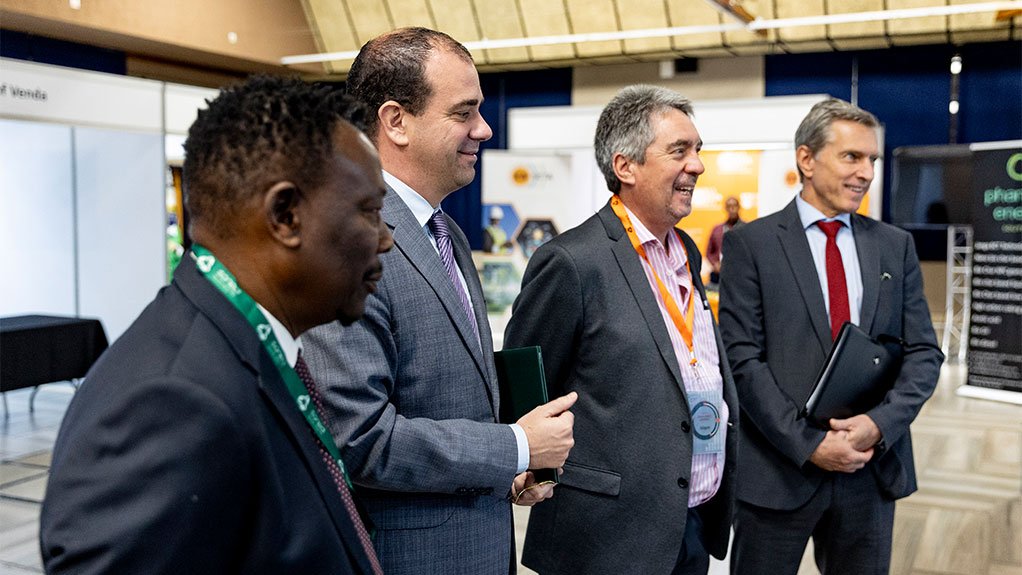

Strengthening the climate resilience of South African industries


Left to right: UNIDO Sustainable Development Expert Nokwazi Moyo, General Representative of the Government of Flanders Thomas Castrel, Chief Director: Green Industries at the dtic Gerhard Fourie, and UNIDO Regional Representative for Southern Africa Dr Diego Masera, visiting the exhibition stands of the innovators
THE INDUSTRY CLIMATE CHANGE ADAPTATION (SAIA) PROJECT
– Climate adaptation as a catalyst for innovation and growth
South Africa’s economy is increasingly threatened by climate change impacts, resulting in scarcity of important natural resources.
To respond to these challenges, industries need to increase their efforts to remain competitive, save scarce natural resources, protect the environment and be prepared for the future.
By embracing green technologies and sustainable practices, industries can enhance their competitiveness in both local and international markets, reduce their environmental footprint and create green jobs.
The Industry Climate Change Adaptation (SAIA) Project supports industries to address the barriers that are currently hampering an accelerated adoption of measures and technologies, and assist in the development of desirable pathways and more sustainable practices to transition to climate-resilient operations.
The project focuses on the water-energy nexus in the agro-processing sector. Specific activities include:
- Implementing and showcasing technology upgrades in pilot enterprises
- Strengthening the ability to develop and finance resilient capital investment projects in the green economy
- Stimulating and nurturing marketable green innovations
- Building capacity in industries, academia and the knowledge institutions to mainstream climate action.
Funded by the Government of Flanders, the project is implemented by the United Nations Industrial Development Organization (UNIDO), in collaboration with the National Cleaner Production Centre South Africa (NCPC-SA) and the Technology Innovation Agency (TIA).
Showcasing companies with industry-focused adaptation solutions
Following a transparent process, five companies were selected for support under the SAIA project through a Direct Enterprise Support Programme, as well as grant funding. The companies are:
- Kulu Eco-Services
- Phambili Energy
- Mbali Success Foods
- Grandstage Trading
- Afroteq Renewable Innovations
Kulu Eco-Services, Phambili Energy and Mbali Success Foods were subsequently selected for further customised acceleration support towards market readiness. They also presented and exhibited at the recent SAIA-hosted Conference on Climate Adaptation for Industry, in Johannesburg.
Kulu Eco-Services is an innovative waste management company tackling South Africa’s organic waste challenges. With 122-million tons of waste generated yearly and only 10% recycled, landfills are strained, especially by complex organic waste streams that composting cannot handle. Kulu addresses this by transforming waste from agro-processing, industrial and hospitality sectors into feedstocks for biogas and biofuels. Through a unique separation and processing system, it treats waste streams that were previously untreatable, converting them into renewable energy. Seed funding has supported the expansion of its pilot plant, which demonstrates the technology’s viability and market demand. Its work directly supports South Africa’s sustainability goals within the water-energy-food (WEF) nexus.
How has the advanced accelerator benefitted the company?
The advanced accelerator programme has been instrumental in refining Kulu’s business model and expanding operational capacity. With its support and seed funding, it has enhanced its service offerings and market reach. The programme funded critical equipment for the pilot plant expansion, enabling a new Fats, Oils and Grease separation process. This development has increased Kulu’s production capabilities, allowing it to manage higher volumes, meet growing client demand, and address processing backlogs. The accelerator’s insights have also helped it tailor services to market needs, boosting revenue potential and positioning it as future leaders in biofuel production within the WEF nexus.
What are the next steps for the company?
Kulu Eco-Services plans to scale production to meet the demand for sustainable biofuel solutions. The next steps include launching a carbon credit exchange platform, expanding its network of waste hubs, and pursuing additional funding to drive innovation and growth in the waste-to-energy market. It is also focused on forging partnerships to advance its mission.
KULU ECO-SERVICES
Enquiries: Dr Pieter van Heyningen
Tel: +27 (0) 79 294 4390
Email: pieter@sustnet.com
Phambili Energy
Technology company Phambili Energy is deeply entrenched in the green technology space with a particular focus on the development and production of bio-energy, bio-foodstuffs, bio-chemicals and other bio-char, organic, sustainable and renewable products.
The company was formed in Lynnwood Manor, in Pretoria, to commercialise bio-waste and alien invasive species. It has developed a pyrolysis technology (branded Jenga BCT) for the purposes of converting various types of waste into bio-char, pyroligneous acid, bio-oil and syngas which are in turn used to make other valuable products. The development process has been ongoing since 2008 when Phambili was incorporated.
Over the years, the company has developed at least three prototypes and imported one pyrolysis plant. The knowledge and experience gained from these trials has led to it developing state-of-the-art technology that can take various types of waste materials and produce several marketable products. These products include the green bio-char coking pellet for the steel industry to replace anthracite coking coal, supercharged soil remediation bio-char, bio-char granular NPC and foliar fertilisers as well as green wood preservative products.
The SAIA accelerator programme and associated seed funding has assisted Phambili Energy to refine its business model and conduct certain activities that have supported its commercialisation process.
The programme has enabled the company to clarify the problem it intends to address through its technology and associated products. The clarification has also positioned it well in the WEF nexus. It is able to redefine its market segments and develop a strategy on how to approach each one. In addition, the company has been able to identify the key revenue streams of the business that form part of the rapid commercialisation strategy.
Using the programme’s seed capital has enhanced the rapid strategy of its product development and testing. The company could speedily enhance the thermal stability of its biochar coking pellet and send it to the customer for testing, which was successful. It was also able to conduct laboratory tests for its fertiliser products, which are now in field testing.
The company is exploring several avenues for growth. The first includes scaling up production by increasing the number of plants in KwaZulu-Natal as well as other provinces in the country. Phambili plans to operate up to 100 plants nationally by the end of 2027. It will also pursue growth by further investigating new, high value and marketable products from its bio-char, green chemicals, bio-oil and syngas.
Currently, it is focusing on products related to agricultural inputs and mining, but is open to market forces that will dictate the long-term product mix. The innovation in the growth strategy will not be limited to the product formulations. It will also be in the technology itself. The main innovation area will be in the fractionating of the wood vinegar and bio-oils as they are being produced. The company is focused on achieving complete refinery activity within the pyrolysis process. The refined green chemicals produced through this approach will open up new opportunities to explore innovative products or enhance its existing offerings.
PHAMBILI ENERGY
Enquiries: Musa Msimango
Tel: +27 (0) 82 649 1218
Email: musa@phambili-energy.co.za
Success Foods
The founder of Jozini-based Success Foods in Kwa-Zulu Natal, Mbali-Success Mkhaliphi, is transforming the food industry with a mission to “unlock the success of nature” through eco-friendly, organic butternut pumpkin products that enhance quality of life. Centered on sustainable, zero-waste practices, Success Foods produces a versatile range of butternut pumpkin products that cater to secondary food producers, health-conscious consumers, vegans and busy professionals seeking convenience and nutrition.
The company’s eco-friendly approach uses biochar fertilizer to grow organic butternuts, drip irrigation powered by solar and biogas, and water-saving techniques, all designed to reduce environmental impact. In their solar and biogas-powered facility, Success Foods processes top-quality butternut pumpkin products like puree and powder, using advanced techniques to preserve the butternut’s natural flavour, colour and nutrients.
The product line from Success Foods features canned butternut pumpkin puree for end users, offering a convenient option for cooking and baking. For secondary food processors, bulk butternut pumpkin puree serves as a versatile ingredient ideal for a wide range of applications from soups to sauces. Its smooth texture and rich flavor make it an excellent base or enhancer for both sweet and savoury recipes, allowing secondary food processors to create diverse and innovative products.
Additionally, butternut pumpkin powder stands out as a nutritious and versatile product for both secondary processors and end users. It can enhance smoothies, cereals, health bars and other foods, meeting the demand for healthy, plant-based ingredients that offer both flavour and nutrition. Butternut pumpkin infused pasta offers a wholesome choice for pasta lovers looking for nutritious alternatives, while butternut pumpkin syrup provides a delicious topping for pancakes and desserts, rounding out Success Foods’ unique and health-focused product offerings.
Guided by a zero-waste philosophy, Success Foods maximises efficiency by using every part of the butternut pumpkin skin, flesh, seeds and leaves minimising waste and reducing production costs. The company’s commitment to sustainable practices ensures a stable, eco-friendly supply chain.
Success Foods has benefited immensely from its participation in the SAIA Accelerator programme. The programme has equipped the business with essential skills, access to specialist consultations and support to meet rigorous food health and safety standards. Looking ahead, Success Foods plans to expand its product line with new butternut pumpkin-based innovations, value-added blends and partnerships with other food producers, while building a strong presence in both local and international markets. Success Foods is setting a new standard in eco-conscious food production with a focus on quality, sustainability and health.
SUCCESS FOODS
Enquiries: Mbali Mkhaliphi
Tel: +27 (0) 79 466 0225
Email: mbali@success-foods.com


